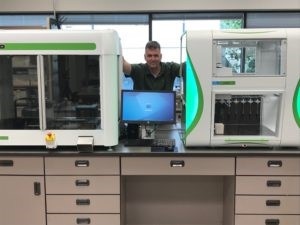Through economies of scale, process optimization, robotics and new biochemistry, lab will be able to slash cost per sample by 600% for large-scale DNA genotyping projects.
April 26, 2018

Texas A&M AgriLife Research and its internationally recognized Genomics & Bioinformatics Service are poised to change the face of agriculture-focused genomics.
Referring to National DNA Day, which celebrates the 15th anniversary of the Human Genome Project, Texas A&M University System chancellor John Sharp said, “It is fitting we open the doors to a revolutionary, one-of-a-kind public agriculture and life sciences genome facility. This facility will impact the health of every Texan by empowering our Texas A&M researchers to develop healthy foods that are good for you, taste great, high yielding and sustainable.”
Masoud Toloue, vice president and general manager for applied genomics for PerkinElmer in Waltham, Mass., said, “It is a great pleasure to expand upon our long history of collaboration with Texas A&M and AgriLife Genomics & Bioinformatics Service. “PerkinElmer is a leading provider of innovative detection, imaging, informatics and service capabilities. We offer solutions spanning the genomics workflow, including nucleic acid extraction, liquid handling, sample preparation, DNA/RNA quantitation, library preparation, data analysis and applications expertise.
“We look forward to working with Texas A&M in the future to bring genomic technology to agriculture researchers around the world,” he said.
PerkinElmer's new Sciclone G3 NGS Workstation and JANUS G 3R NGS Express Workstation have been installed at the AgriLife Research Genomics & Bioinformatics Service in College Station, Texas.
“This will be a magnet for public and private agriculture researchers from around the state, country and world to come to Texas A&M to take advantage of this revolutionary advancement in DNA genotyping,” said Dr. Patrick Stover, vice chancellor of agriculture and life sciences at Texas A&M. “The major limiting factor to scientists around the world striving to improve the healthy attributes and other advancements in crops and livestock has been the expense of genetic improvements. Without genetic improvements, change through traditional breeding methods takes an extensive amount of time.”
Dr. Craig Nessler, director of AgriLife Research in College Station, said AgriLife Research has been able to attract extremely qualified individuals to work in the areas of genomics. “They have only been limited in capabilities by the equipment they were able to work with,” Nessler said. “This collaboration is putting the scientific knowledge with the state-of-the-art equipment.”
Dr. Bill McCutchen, executive associate director of AgriLife Research, said this combined effort is creating a whole new capability that did not exist before because of the high cost associated with DNA sequencing.
“Genetic researchers who were previously limited to screening handfuls of individuals due to extreme costs will now be able to screen tens of thousands of samples,” McCutchen said. “In combination with our new gene editing tools, the ability to process greater numbers will result in faster improvements to crops and livestock, which is needed to meet the demands of the growing world population.”
Dr. Charlie Johnson, director of the Genomics & Bioinformatics Service lab, said, “We have been striving for the last eight years toward a goal of becoming a world-leading center of agriculture genomic excellence. Now, with a capability of processing 50,000 samples per year and with the ability to grow to 100,000 in the coming years, empowered by PerkinElmer’s state-of-the-art robotics systems, we are there.
“This has allowed us to launch our one-of-a-kind, high throughput, multimillion-dollar genomics research lab,” Johnson said. “We are very excited about the possibilities this will provide for Texas A&M and agricultural research around the world.”
He said the collaboration’s first output will be the development of an exclusive, first-of-its-kind academic genotyping pipeline called AgSeq, which combines Illumina’s latest sequencing technology with PerkinElmer’s automation in library preparation, a proprietary sample bar-coding system with the capability to provide low-cost genotyping-by-sequence using low coverage whole-genome sequencing.
“Our service faculty will be the sole source for access to PerkinElmer’s custom high-throughput DNA preparation kit designed for agriculture applications,” Johnson said. “In terms of research and development, our public/private team strives to develop solutions that will allow scientists to take full advantage of genomics across agricultural and life science applications in ways that have been impossible until today.”
He said through economies of scale, process optimization, robotics and new biochemistry, the laboratory will be able to slash the cost per sample by 600% for large-scale DNA genotyping projects.
“Previously, these larger projects were done using technologies that all had significant drawbacks; the biggest when it comes to whole-genome sequencing-based genotyping was cost,” Johnson said. “As an example, a human genome cost between $1,500 and $2,400 to be sequenced in a commercial lab. Using all the tools we are developing, using low-coverage sequencing, we can obtain 85-95% of the same information for 33 times lower cost. This puts the price point of sequencing-based genotyping at the same level or below DNA microarray,” he said. “One of the great limiting factors for large-scale agriculture and life science genome research has been cost, which limits the size of studies."
You May Also Like

.png?width=300&auto=webp&quality=80&disable=upscale)

